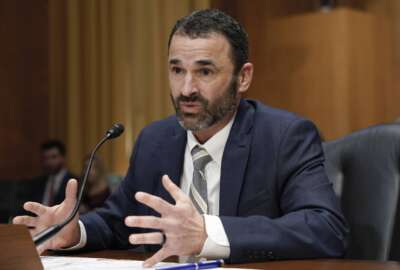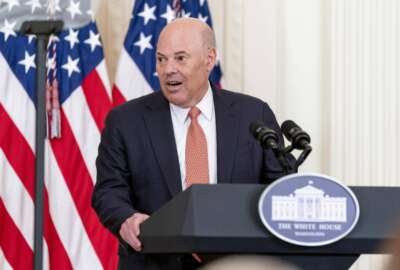Hubbard Radio Washington DC, LLC. All rights reserved. This website is not intended for users located within the European Economic Area.
New leadership at the Professional Managers Association
There is new leadership at the organization that represents managers and other non-union employees at the Internal Revenue Service. Kelly Reyes was named the Pr...
There is new leadership at the organization that represents managers and other non-union employees at the Internal Revenue Service. Kelly Reyes was named the Professional Managers Association’s (PMA) new executive director last week. She replaces Chad Hooper, who left the organization this past summer. Reyes previously served as PMA’s national vice president. For a look at the latest with the PMA, Federal News Network Deputy Editor Jared Serbu talked with Kelly Reyes on the Federal Drive with Tom Temin.
Interview Transcript:
Jared Serbu Kelly, first of all, congratulations and definitely want to talk about some of your priorities for PMA. But get us started if you would about the pathway that led you up to this point?
Kelly Reyes Well, thank you. I’m excited to be here. So, you know, before I came to the IRS, I had a career as a principal of a school. And I was also an adjunct professor for a private university. My husband and I, we owned several businesses, very successful businesses. And I was also a speaker for educational workshops. So I really came from a place of wanting to make an impact and be a part of people’s lives. When I came to the IRS, I came because I had a life change with my mom and she was having going through Alzheimer’s. And my sister lived in Austin and I temporarily relocated to help her. And that’s when I came on board IRS temporarily. I had only planned to work there for just a few short years and then go back to Arlington with my family. But before I knew it, my family wanted to locate to Austin, and 14 years later, I was still there at the IRS. I was served as an IRS manager for ten years. I was a frontline manager, a department manager and a territory manager, and I loved every minute of it. I had the opportunity to learn about government leadership and to manage from many different perspectives as I worked in different business units across the IRS. I was mentored by some amazing executives and senior leaders. And these rich experiences and knowledge that I gained from them and my leadership skills. I really think those are the things that helped prepare me to be the executive director for PMA. So now I’m eager and I’m ready to take on the challenges of our managers and to grow PMA into a strong voice that will lead our association into the future.
Jared Serbu And I imagine the fundamental goals and objectives of the organization aren’t going to change much here. But what do you really want to emphasize in your leadership role here?
Kelly Reyes You know, there are some big concerns that keep getting elevated. One of them is the compensation for managers. They really want a fair and equitable compensation that’s reflective of their performance. And we would really like to see that the IRS come in and revamp that system. You know, the pay band system is really made up of three different pay bands, and that is their their compensation is based on this performance. PMA supports the reform to make sure that the pay is fair, that it’s fully funded and that it’s equitable and that it really, truly rewards their performance. We’re hoping to see that it’s going to be transparent. That’s going to be well communicated. And it’s going to provide the avenues managers need for advancement. We also want to make sure that the performance ratings are not just solely based on their mid-year or their annual discretion. We want to see the managers get consistent feedback throughout the year and counseling for their rating periods. You know, managers and even non bargaining unit employees, they should have a process to agree their performance appraisals when they don’t see what they should be seeing. And right now, the only one that can grieve, too, is the people who approved the performance appraisals. So we would like to see a change there. We would also like to see that the performance awards that they get shouldn’t be denied to managers and non bargaining unit employees when they reach their pay gap. So there’s lots of things to look at for that. But we also want to see management development. You know, our managers need training at all the different levels that they work at. It is so important that our service managers are also included in this training. The service centers have a cadre of managers and these frontline managers only work during peak periods. So it’s difficult for them to participate in training when they’re not up in the non bargaining unit position. So these managers really need to be involved and they need to be equipped before they come up when this season start. So many of these aspiring managers, when they come into these roles, they forfeit their bargaining unit awards. And we would like to see them not lose those awards when they step up. The last thing that we’re really focused on in our goals at PMA is just retention. The IRS really needs to consider putting managers in place. Putting the measures in place that will attract and retain good managers. Larger performance bonuses for them would go a long way in helping keep these managers, especially since the responsibility that they gain when they’re manager is not necessarily commensurate with their pay. To retain managers, we have to have a program in place for them to encourage them to return and to encourage them to seek the permanent positions when those are announced.
Jared Serbu If I can step back a bit to the pay reform issue that you started that last answer with, for people who aren’t tracking this issue, can you just tell us a little bit about what you see as the deficiencies in the current pay system?
Kelly Reyes Well, the managers, they’re they’re subject to this alternative pay. It’s the higher pay band and it’s made up of three pay bands. So their compensation is based on their performance, but it’s subjective to the leadership. PMA supports that. The reform that they get on the payment system. It needs to be fair and needs to be reflective of their performance. It also needs to be fully funded. We don’t feel that it’s fully funded for them. It needs to be more equitable to the work that they do in the Performance Management Review Board. Many times there are people reviewing the annual appraisals that managers do and they’re not familiar with the work. So the way a performance appraisal is written is very important that it strategically communicates what the manager did. And it’s subjective as to whether or not someone feels they’ve met the expectations, they’ve exceeded it or they’re outstanding in their job. So we would like to see more equity involved in that process.
Jared Serbu And speaking of funding, on the topic of IRS funding in general, you know, in talking with your predecessor over the years, just gotten the general sense that underfunding at the IRS has been almost demoralizing, I think is the word I would use for a lot of the workforce, including managers. I’m just curious for your perspective on how much has changed in that arena with the passage of the Inflation Reduction Act and the huge influx of money that’s come in to the IRS budget. How has the agency been spending that and has it changed things?
Kelly Reyes Well, you know, we have our new commissioner, Dan Werfel, and he’s really in tune with what the IRS needs. And he really is in tune with opening up communication lines and listening to the leadership in the employees throughout the IRS. So I think that is really a big first step in making the types of changes that the IRS needs. But he’s also in tune with what the agency is going through. PMA really supports the sufficient funding for the IRS. We’re not able to make the policy changes we need to make unless the funding is there and that funding is consistent. PMA will always support and ensure that the IRS receives what it needs to carry out its mission and to be able to fulfill the mandates that are handed down by Congress. IRS funding has to be maintained. But not only that, we also need to make sure that the annual and on time appropriations are received. IRS supports the consistent funding in the budget reform. I think one of the biggest problems we feel is that we keep getting caught up in these continuing resolution and these shutdowns and these across the agency board budget cuts. They’re really counterproductive and they cost the taxpayers more money in the long run. You know, when you think about it, there’s not a private business out there that would survive or even thrive if their budgets were reduced without regard to their programs, the priorities they’ve set. And even if their financial planning was subject to, you know, annual political whims or or complete shutdowns, the federal sector, this system leads to inconsistent hiring and staffing that leads to processing backlogs, which we all saw in the news. And it also most importantly, leads to the inability to deliver the customer service that we feel our citizens deserve.
Copyright © 2024 Federal News Network. All rights reserved. This website is not intended for users located within the European Economic Area.
Jared Serbu
Jared Serbu is deputy editor of Federal News Network and reports on the Defense Department’s contracting, legislative, workforce and IT issues.
Follow @jserbuWFED





